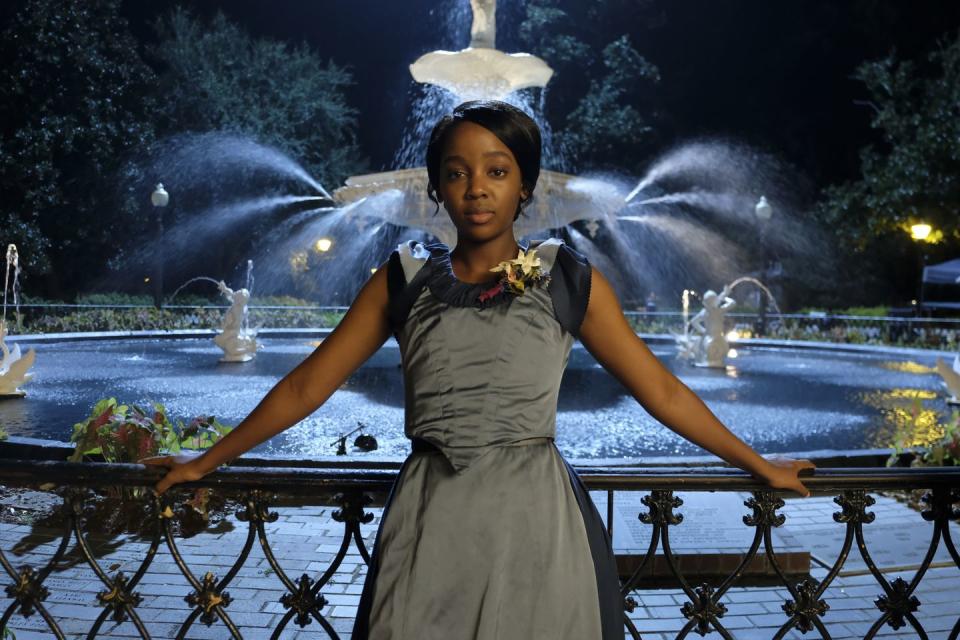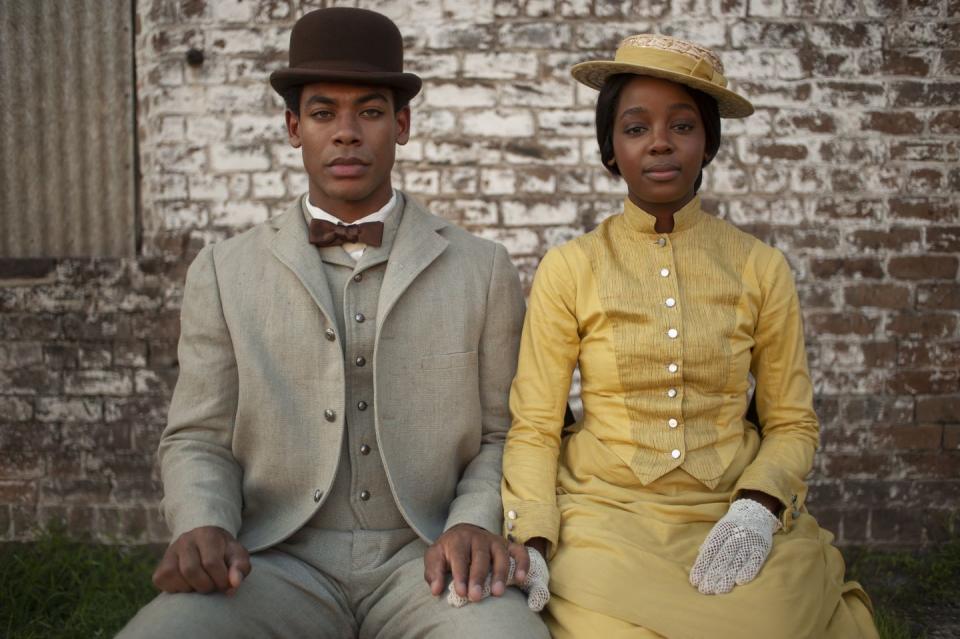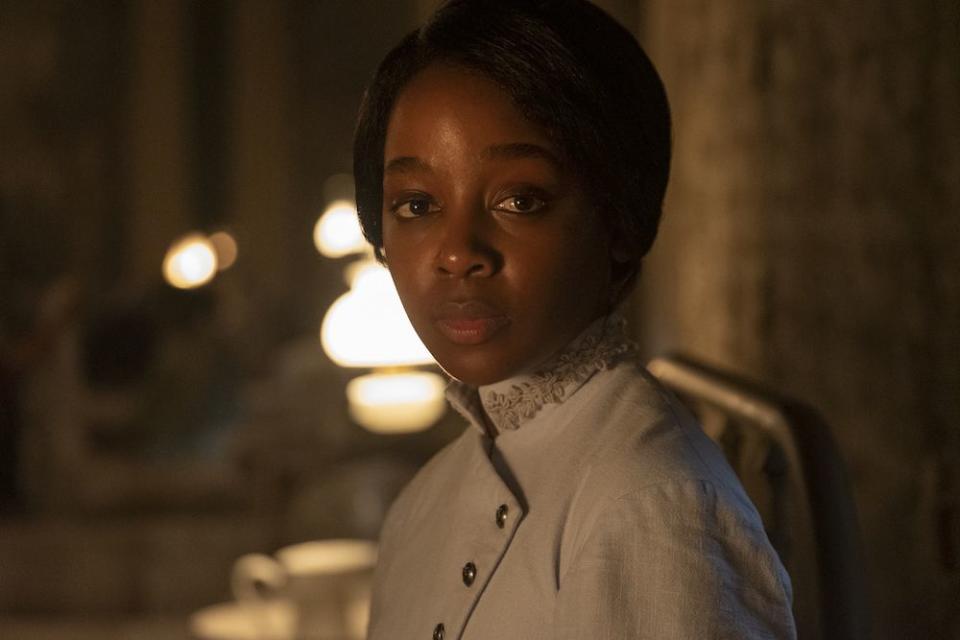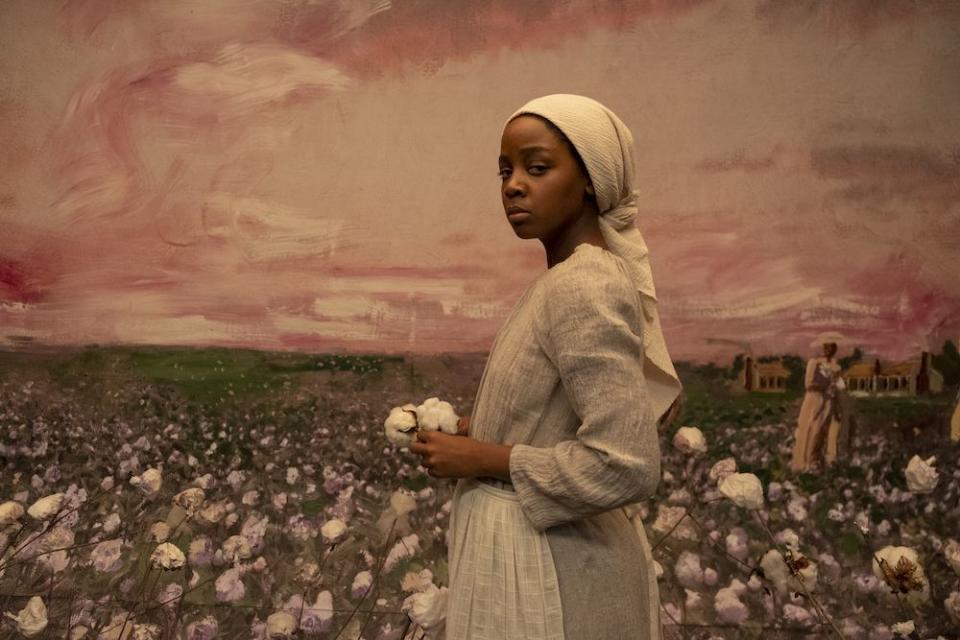Thuso Mbedu Says Playing Cora in "The Underground Railroad" Healed Her
- Oops!Something went wrong.Please try again later.
- Oops!Something went wrong.Please try again later.
Thuso Mbedu was beaming when she logged onto her Zoom interview with Oprah—an expression she rarely displays in Barry Jenkins's powerful adaptation of The Underground Railroad, now streaming on Amazon Prime. "So this is what you really look like!" Oprah said upon greeting her.
The 29-year-old South African actress is the protagonist of the show's ten-part saga. In the first episode, Mbedu's character, Cora, escapes from the same Georgia plantation that had enslaved three generations of her family. Over the course of her perilous journey, Cora endures hardships that are often difficult to watch—so much so that Mbedu recommends audiences "pace themselves" through the show.

During their chat, Oprah praised Mbedu's acting, which has earned acclaim among critics. "I have never, ever in this lifetime seen as consistent a performance as you have given in The Underground Railroad," Oprah said. "You have the gift, girl." With The Underground Railroad, Mbedu became the first South African to lead an American TV show. Next, Mbedu will appear alongside Viola Davis in the movie The Woman King.
In an intimate conversation, Mbedu speaks to Oprah about her friendship with Joel Edgerton, who plays a slave-catcher; how the role of Cora helped her heal, and the on-set moment in which she nearly lost herself.
I have to ask you: How are you? Psychologically, mentally, spiritually—how did you do that?
I’m good now, I’m good. After the shoot wrapped I went to see a therapist because I felt that I really needed to debrief from the character. The character and I have a lot of similarities in terms of our foundation. I had to differentiate between the two. I’m good now.
During episode 1, I didn’t know if I was going to make it through. I looked down at my Apple Watch and my heart rate was 101. By episode 3, it was 110—and I'm just sitting in the chair. I had do this in a measured way. But you weren’t doing it in a measured way. In almost every scene, you are there. How did you prepare yourself?
I honestly had to do a lot of research. I told myself that whatever I thought I knew about the enslaved people in the 1800s, I must forget about and take everything anew. I read a lot, I consumed a lot of material, Barry sent me stuff to read. He sent me audio testimonials of former enslaved people. I remember hearing them for the first time and something really shifted in me. They spoke very broken English because they were taught English for instruction, not conversation. If you were to go to South Africa or different parts of Africa today, you’d hear people speak like that. It stopped being an African American story and it became a story about Africans in America.
I had to sit with my dialect coach and say, "Yes we are working at the accent, but I want to and need to track Cora’s vocal journey." You store away traumas and experiences through your voice. I had to prepare her emotions, mental, and physical journey from episode 1 to episode 10, but shooting out of sequence. I had to keep careful note of what was happening. Barry was there supporting and guiding me along the way.
You cannot, I know this for sure, go through a process like this and not come out changed. What changed in you?
A lot changed within me. After I met Barry for the first time and had a casual conversation with him, he had looked at me and said, “You are the character.” I didn’t get it. I didn’t see what he saw. Cora is isolated within her own community. She’s had her own great share of traumas, having been gang-raped within her community and having those same men spread rumors about the fact that she sleeps with animals and howls at the moon. She’s ostracized. She’s built a world in her head where she’s safest there. Her mother had left her at a young age. She has a foundation of great loss, rejection, and abandonment.
On my end, I lost my mom at the age of four to a brain tumor. At the time, I didn't understand what was happening. At the funeral, apparently I was talking to my mother and telling her to wake up. I didn’t understand what was happening,
At four, you wouldn’t.
Yeah. I carried that loss, abandonment, and rejection with me for the majority of my life—becoming very hard, keeping people at a distance, not forming relationships in any way, shape or form. I had to face that in playing Cora. I had to heal from that in playing Cora.

There was another instance where I had arrived in Savannah, GA during my preparation process. I was 28-years-old at the time. That was the very first time in my entire existence that I dreamt of my mother. In the dream, I walked into the apartment that I was living in and she said, “Everything is going to be okay.”
We shot a scene between Cora and Caesar in episode 8, and it was exactly what had happened in my dream of my mother. Performing in the scene gave me a closure that I did not realize I needed for myself. I wrote Barry a very long note reflecting and saying thank you for allowing me to get through this journey. This character has healed parts of me I didn't even know were wounded. Cora challenged me in many different ways and I am a different person because of her.
From episode 1, you endure whippings, and you watch a man get burned alive, and you survive a mass shooting. One hardship after another. What did you do to protect your own mental health?
At the beginning, I had little tricks I put in place. The first time I walked into a set and saw people in the wardrobe it was hard for me to take in. I developed a thing. If I walked into the set, I kept my eyes on the ground until I could look up at the eyes of Cora. Taking the environment in as Thuso was too much. I’d only allow myself to live in that environment when action was called.
On weekends, as a cast and crew we’d go bowling, we’d have game night, we’d have karaoke night. We’d completely detach from what we were doing on set. I’m also fortunate enough to have friends that I really trust and really understand me as a person. When I’m acting out of character they’d go, “Thuso, you're not being yourself. What is the root of your reaction or how you’re acting in the moment.” That forces me to go, You’re not speaking as Thuso but it’s the residue of the character bleeding into your everyday life. Now, how do you separate? That moment of being conscious and saying, This is not me, was a difference-maker.
We also had a guidance counselor who would check in with me on set—whether I’d ask for her or not. She’d say, “Are you good? Are you here?” She’d physically touch me just to ground me. Barry was always there as well, checking in. I was surrounded by a cast and crew that I really felt that I could lean on. I never felt that I was alone throughout this journey.
How did you interact with actors like Joel Edgerton, who also did an incredible job here? Are you kicking it with Ridgeway on the weekends?
Yes, yes. We were hanging out. Joel and I really got on well. He was clear from before we started: As someone who’s been in this industry much longer, I could call on him for anything. Life on set, life out of set. If I felt that I was uncomfortable with something but couldn’t voice it out, he could be that voice for me. We had a great relationship to the point where sometimes, depending on the scene or the day–because you want to respect everyone at all times—it would be, “Action!” we’re 100 percent in character, bickering, butting heads, fighting, to “Cut!” and Thuso and Joel are joking and having a grand old time. We hung out.

That’s good to know. How do you recommend viewers take care of their own mental health while watching and after watching?
I really do recommend that people pace themselves. When I got the footage, Barry told me to pace myself. He said, “Thuso, it’s not easy to take in. Pace yourself.” I made the mistake of allowing myself to go with it. I watched it over three days but it was a lot to take in in a very short space of time. I had a big migraine and couldn’t process my thoughts and feelings afterwards.
You’re watching it in the comfort of your own home. You can pause. You’re not forced to watch everything in one go. Take a walk. Get some fresh air. Verbally process what is happening with someone that you trust if you can do that. Having it just be in your head and trying to deal with what is happening internally can mess you up. If you have someone you can talk to about your feelings, it can go a long way.
There’s been a lot of conversation in recent years about doing more movies about Black joy instead of doing things that retread our history. What’s your response to that? Why did you want to sign on to this?
We were shooting in 2019 and a whole lot was happening to the Black body in 2019. I realized how relevant it is. We cannot run away from what the story is telling and what is still actually happening. There are direct parallels you can pull. You can go from episode to episode and draw parallels. They like to say, It happened such a long time ago. You should get over it. But that is not true. All the pain, the hurt, and the resentment that one feels, that one has inherited over generations, you don’t have the words to articulate.
Generational trauma.
Exactly. You aren’t crazy for feeling that way. Everything that you’re seeing in the story is what happened then but you’re experiencing now.
You’re also carrying that ancestrally. One of the things that I learned when I did Beloved, and I also feel every time I read a slave narrative or come across a story as powerful as this one, is amazing grace. I feel, Look at what I come from. Look at how they were able to endure the most impossible circumstances. For me, there's rejoicing in it. And a kind of privileged understanding of where I come from. Did you get a sense of that?
Yes, 100 percent. And the way that Barry treated the project in terms of shooting it. For me, it’s unlike what we’re used to seeing when it comes to telling these stories. I can confidently say that never at any point did I feel like, within the brutal scenes, that Barry was showing it to sensationalize it or putting it on display to get a reaction. It just so happens that this is what the body endured in this space and time. But there’s a lot more to it. We have moments where we can celebrate the Black body for enduring, for fighting and pushing hard under the circumstances. And that’s something I really appreciated.
One of the reasons I felt episode 2 was so striking was because the moment she walks into that doctor’s office, you know no good can come. What were you thinking about when you were lying there on the stirrups? Everyone in my house went, “Whoa!”
In that exact moment, for me, there was a great discomfort to have someone that close. When you’re shooting, you’re 100 percent protected and not exposed. But the reality is, this is a white man who has some sort of power over me. It’s greatly uncomfortable. It takes trust and vulnerability to sit in that position on your back.
Every woman who’s done it in her doctor’s office feels something. Now you’re doing it with a crew in the room!
Exactly. For Cora, the first time anything came at her in that direction was forced and an act of violation. Cora doesn’t speak about how she feels. We’re lucky that her face allows her to see her feelings. There’s a whole lot happening.
One of the great things about Barry Jenkins is that so much is told in silence and in between the sentences. You allow the world of pain to come through your eyes. What does it takes to do that?
For me, it’s mentally going, Be 100 percent in the moment. Allow every single thought that the character is having to be had. Don’t dictate what she’s supposed to be showing. Just allow the thought to happen. You go from one thought to one thought. Your thoughts take detours and they remind you of something. They bring up memories. Instead of saying, “I need to be thinking about this," allow that journey to happen.

Was there any particular scene that was harder to do than others?
I remember there was one scene where everything is happening. Cora has lost a number of people in her journey—I’m not allowed to give spoilers, but this is episode 9. It’s as scene between Cora and Ridgeway. In it, Ridgeway was holding her in a particular way. Physically, I couldn’t breathe. Emotionally and spiritually I was still in the chaos of what was happening in that sequence. Coming back to my body after that moment was really hard, to the point where I actually sought the guidance counselor out and I said, “I need you to help me to find me. I don’t know where I am right now.” I’d surrendered to the moment. It was a very traumatic moment.
What do you think Cora is thinking in the final moments of this show?
I think, in that moment, she is holding on to hope with everything that she has, because of everything that she’s been through. She has had to fight to get to where she is. She sees the light. She sees the possibility of actually getting to where she is. However, her experience has taught her that nothing is guaranteed. She’s tired. She’s exhausted. I see it, but if I have to fight again to get there, I will do exactly that. I cannot surrender to this moment. Now she has someone of the younger generation. It’s harking toward the future that she has to protect and ensure that they have that hope.
We didn’t know your name before this, but we’re going to be going Thuso, Thuso, Thuso. It is my great honor, pleasure, and privilege to be talking here. Great things are coming.
You Might Also Like

